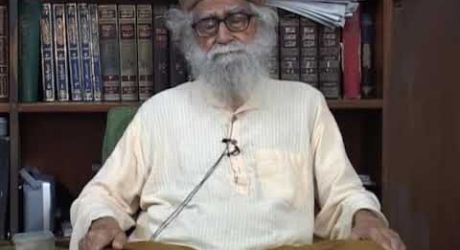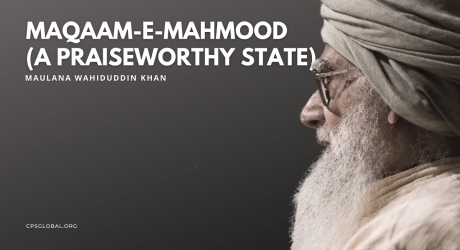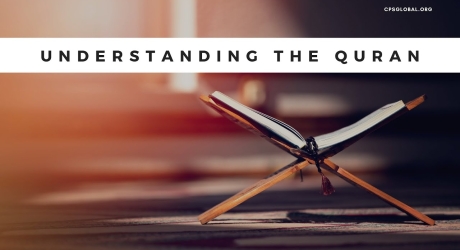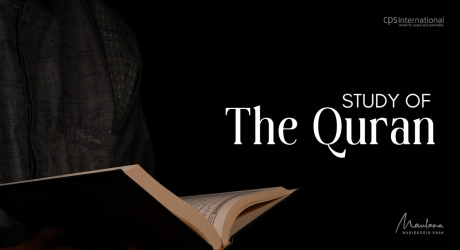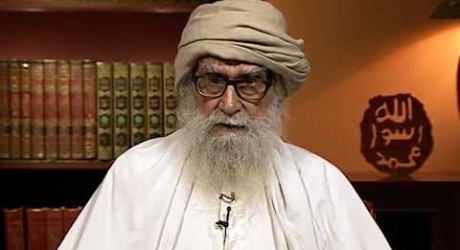The Quran is the Book of God preserved for all time to come. It is written originally in Arabic and accessible through its translations to the non-Arabic knowing world. English is truly the international language. The Quran Complex, Madinah, Saudi Arabia, in a research on the English translations of the Quran, concluded: “Despite 47 English Quran translations, none has received the acceptance of the modern world.” [Bibliography of the Translations and the Meanings of the Quran in English (1649–2002)] To fill this gap, Maulana Wahiduddin Khan worked tirelessly to translate the Quran into English, published in 2008 under the title The Quran. Edited by Professor Farida Khanam, the translation is in contemporary English, lucid, easy to understand and has received universal acceptance. In its introduction, the Maulana explains that the Quran aims to bring about an intellectual revolution within man, called maarifah (realisation of truth) (5:83) and make him aware of the Creation plan of God. The purpose of the Quran is to tell man why God created this world, the purpose of settling man on earth, what is required from man in his pre-death life span, and what he will confront after death. The Quran, thus, serves as a guide for the man in this world as well as in the Hereafter.
This topic has been taken from a Hadith. According to this tradition, some young companions of the Prophet once visited him and stayed with him for a while for training. One of these Companions is recorded to have said,
“First we understood imaan and then we learnt the Quran.” (Seerat Ibn Maja)
This saying has been mentioned in many books of Hadith. And it clearly implies that according to the Companions of Prophet Muhammad, imaan was of prime importance and Quran then followed.
Why did the Companion say so?
This Hadith is attached to a profound wisdom. It conveys that mere knowledge of the Arabic language or reading the translation of the Quran does not suffice.. One needs to ponder over the verses of the Quran and the Hadith in order to know their deeper meaning. The Companions knew Arabic language; however, they used to spend long hours reflecting upon the verses of the Quran. In fact, I could understand the meaning of the above cited Hadith only after giving considerable thought to it.
What is Imaan?
Imaan, in the above Hadith means marefat. Marefat has a very deep meaning. No word in English conveys its meaning such as it ought to. The closest in proximity of its meaning is the word “realisation”. Literal meaning of marefat is “pehchanna” (to know) or deeply “pehchanna.”
The Companions did not reach out for the Quran at the first go. They first prepared or developed their mind and then they understood the Quran. The Indian Physics Nobel Laureate, CV Raman (d.1910) was once told by a man that scientists do not show any great feat in discovering new laws or phenomena; they just discover it “accidentally.” Raman replied, “Yes, but this accident happens only to a scientific mind.”
This illustration aptly explains the importance of a prepared mind. It is such a mind alone that can understand the Quran. This was also the method of the Companions; when they stayed with the Prophet, they first prepared their minds and then read the Quran.
However, majority of Muslims continue to remain unaware of this process. They just recite the Quran without preparing their minds and hence do not understand it. I once met a person who had been doing dars-e-Quran (recitation of the Quran) for the past twenty years. Surprisingly, when I asked him about how it changed his personality, he did not have an answer to give.
Incorrect starting point
To highlight the importance of picking the right starting point, I would like to cite the example of a scholar from Deoband, Maulana Mahmood Hasan, also known as Sheikh-ul-Hind. He was deported to Malta by the British as a result of his direct involvement in 1857 when the Indian Ulema had revolted against the British.
Although during a visit to Malta, I had became intrigued to visit the place where Maulana Hasan spent his days (when deported by the British), but I could not find it. Maulana Hasan had spent three years in Malta and returned to India in 1920.
While addressing a gathering of ulema in India, Maulana Hasan said that while in Malta, he got an opportunity to reflect extensively and this led him to conclude that Muslims must read and spread the Quran everywhere. This was said in 1920. But quite literally, if today one visits any mosque, one would surely find a copy of the Quran and the dars-e-Quran also has been taking place in large numbers among the Muslims.
In a similar vein, Allama Iqbal (d.1938) initiated a movement based on the Quran. Because of this movement several copies of translation of the Quran were spread in the area of Punjab or Pakistan. However, the fact that looms at large is that such activities have yielded no result.
Result-less movements
A deliberate and objective analysis of such a movement would bring to fore that Maulana Mahmood Hasan did not choose the right starting point. He should have jolted the minds of Muslims to make them realise that why in spite of all the sacrifices they made by revolting against the British, no positive result came through, particularly when the Quran says,
“God will surely help him who helps His cause.”(22:40)
Muslims should have been made to realise the blatant fact that during all these years of their futile struggle supposedly for God, they failed to receive His promised help. In fact, they have simply been dying without producing any result. Such thinking would have allowed them to re-assess the entire situation.
It is worth mentioning that ever since the Muslims began their movement of dissent towards British, the latter became hostile towards them. Any community could progress at that time only if the British were not hostile to them therefore, Muslims did not progress while other communities did.
According to another verse in the Quran,
“We bring these days to men by turns.” (3:140)
Had Maulana Hasan understood this verse he would have realised that the British rule in India against which he was revolting, was in accordance to the law of nature. British rulers in India just replaced the Mughal rulers. The Mughals proved incompetent with respect to the technological prowess of the British and hence were overtaken by the latter.
The Muslims should have realised this fact that British rule in India was in accordance with the law of nature and hence shouldn’t have revolted. Instead, they should have availed the newer opportunities for example, communication, transportation, modern education brought by the British. The biggest boon that was brought about by the British rule in India was religious freedom.
According to a verse in the Quran,
“Change is brought about by God’s decision.” (13:12)
The political change in India could be understood in the light of the above verse. Also, the transfer of political seat to the British did not shut or close opportunities in other non-political areas. However, Muslims failed to realise this and kept fighting for political power. This phenomenon can be explained by the following saying of Hazarat Ayesha,
“They read the Quran but they did not read it.” (Musnad Ahmad)
Correct Starting Point
The correct starting point for Maulana Hasan and Iqbal would have been marefat-e-Quran. But unfortunately, at the time of Iqbal, Muslims had degenerated greatly; they had forgotten that they were dais and other people were their madu. This relationship between Muslims and others was forgotten and therefore, the Muslims started considering others as their rivals.
Akbar Allahbadi was known during his lifetime as waqt ki zabaan. However, he absurdly made fun of the western civilisation. This was due to hate for the West. Such people who hate the world are not even successful in worldly business; doing religious work is far impossible. A businessman also cannot afford to hate his customers; he has to adopt a customer-friendly attitude.
The Muslims at the time of Iqbal had only hate in their minds for the rest of the world. It was due to this that during the 1930’s the concept of partition came up for the first time. The British gave them what they desired but what was the result? Even after its sixty years of existence, Pakistan is embroiled in violence and destruction.
The root cause of all these problems can be traced to the actions of ulema. Instead of spreading the Quran they should have spread the mind of Quran, which would have enabled them to reapply the Quranic ideology in the new situation.
Iqbal wrote a book with the title, Reconstruction of Islamic Thought. However, the correct title should have been, Reconstruction of Muslim Mind on Islamic Lines.
The only book which has had an appropriate title during last hundred years was written by Mohd. Abdul Latif, entitled The Mind Al-Quran Builds. The title was correct, but the content was traditional and therefore was unable to address a modern scientific mind.
Another example of lack of perspicacity is found in the “azaad Hyderabad” movement that was started in Hyderabad by Dr. Hamidullah. This movement sought a ridiculous geographical jump for Hyderabad from within the Indian Union to Pakistan as it had owed allegiance to Pakistan.
Disadvantages of unprepared mind
It is imperative to understand that when people read the Quran without a prepared mind, they fail to understand it. For example, many Muslims in India claim that they have been discriminated against and so they live in a complaint mindset. They do so despite having read the Quran and the verse in it which reads,
“If you persevere and fear God, their designs will never harm you in the least.” (3:120)
Unlike Muslims of today, the companions of Prophet Muhammad said,
“First, we prepared our mind and then understood the Quran.” (Ibn Maja)
According to a tradition, Caliph Umar had fell down after listening to just one verse of the Quran and said that, “My feet refused to bear my weight anymore.”
Case of Palestine
Under the Balfour Declaration in 1948, Jews were allocated roughly half of Palestine and Arabs were given the same area including Jerusalem. In the light of the Quran, this was a just decision. It was fair that these Jews, who were in Diaspora, be allowed to come back to their homeland. But Muslims failed to understand this verse of Quran in which, Moses said addressing the Israelites,
“O! My people enter the Holy Land which God has assigned for you.” (5:21)
Arabs refused to accept the right of Jews to come back and settle in their land and have therefore been fighting and sacrificing their lives for the last sixty years. The have made tunnels on the Gaza-Egypt border for smuggling arms to bomb Israel. However, all their effort have been in vain.
According to Arabs, their actions are in accordance with the Quran. But if this work was in accordance with the Will of God, why has God’s help not reached them in the last sixty years? Why have they been totally destructed, when on the other hand, the Jews are progressing and flourishing?
Conclusion
According to the Quran,
“And never will God allow those who deny the truth to harm the believers.”(94:141)
This verse in light of the result of the actions of Arabs should make them realise that they have been wrongly following the path of violence. Had they accepted the Balfour Declaration, 50% of the land, including Jerusalem would have been with them and no harm would have befallen them.
Therefore it is important that we do not merely read the Quran but first prepare our minds and then undertake the study of Quran. This can be explained by the following example. If the foundation brick of a building is not laid appropriately, the whole structure bears its brunt. And since the starting point of the Muslims was wrong and not on the companion’s pattern, all they have seen is devastation.
Even the Muslims in India will be often times heard complaining about the communal riots that began post 1947 partition. But they not ponder over the verse in the Quran that urges implores them to exercise patience in their conduct. As a result of their impatience, they pave way for the following Hadith come true:
“If one does not accept lesser evil, one will have to accept the greater evil.”
(Ibn Tabarni)
If the teachings of Quran are told in an abstract way they will be of no use. There is a dire need to tell about the applicability of these verses in the modern-day context. We have to reassesses and revise as almost for the last 100 years, recitation of Quran has been taking place in mosques and madassas. Muslims believe that Quran is an encyclopaedia and this only feeds them with pride instead of leading them to realisation.
These faulty interpretations of the Quran have to be re-looked into. To cite an example, a verse in the Quran says,
“Indeed We have the power to restore his very fingertips!”(75:4)
The word ‘fingertip’ here was been wrongly interpreted as ‘fingerprints’ just to bring about a mysterious element in the reading of the Quran. All this while, Quran has been read in a manner that fed our pride alone.
But the need of the hour is to strongly re-assess our parameters and ensure that we develop the pre-requisites before we get up to read the Quran. This would allow us to understand its true meaning and enable us to apply its wisdom in our conduct and take due guidance from it.
May God guide us!





